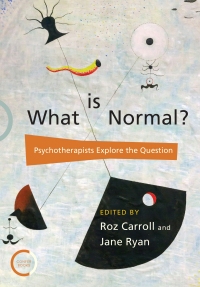Can ‘‘being normal’’ ever be observed and tested? Who defines the norm of mental health? Is it constrained by a social concept of normal? And how do we ever reach an understanding of ‘‘not normal’’. An outstanding collection of therapists consider how their profession is engaging with these questions.
What this book reveals so clearly is that, when probed, the notion of normality is fragile and shifting. It is not clear who decides what being normal means in any historical moment, or who is entitled to say. Nonetheless, concerns with conforming, fitting in, and being accepted are deeply pervasive. For most, being normal is a goal, and deviation from accepted norms feels like failure. Yet many people do not really feel normal. When sexuality, gender, health, ethnic group or any other common variation on the dominant theme is at play someone can feel out of step with this elusive standard. Others depend on being different to be creative, radical and discerning. Readers may conclude that it is our very uniqueness as individuals that makes us usual, and that we rely on our edge dwellers for cultural growth.

